Antibiotics are powerful medicines used to treat bacterial infections. They work by either killing bacteria or preventing their growth and multiplication. These drugs are not effective against viruses, making them useless for viral infections like the common cold or flu.
Antibiotics that target intestinal bacterial infections, especially those that help stop vomiting and diarrhea. Understanding how antibiotics function, their uses, and their side effects is essential to managing bacterial infections effectively.
Recommended Reading: Best Vegan Brain Supplements (For Brain Health)
Antibiotics For Intestinal Bacterial Infection (Stop Vomiting And Diarrhea)

Table Of Contents
Recommended Readings: Antibiotics For Skin Rashes And Itching | Strongest Allergy Medicine
What Are Antibiotics?
Antibiotics For Bacterial Infection
Antibiotics are medications designed to treat bacterial infections by either killing bacteria or inhibiting their growth. They are not effective against viruses and are commonly used to manage various bacterial illnesses.
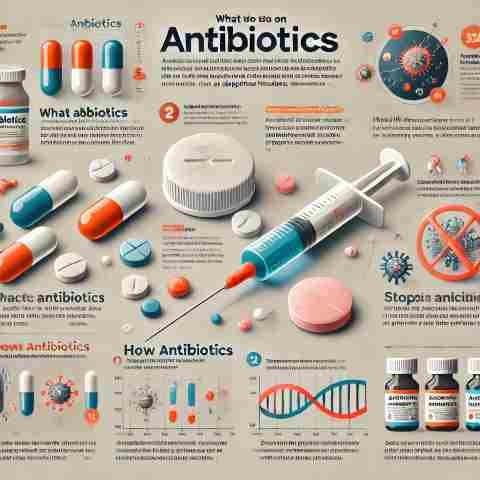
Antibiotics are medications used to fight bacterial infections. They help by killing bacteria or stopping their growth. Antibiotics come in various forms, including pills, liquids, creams, or injections, and are essential for treating many bacterial illnesses, including infections in the intestines.
How Do Antibiotics Work?
Antibiotics work by attacking bacteria in different ways. Some destroy the bacteria’s cell walls, while others stop bacteria from making proteins or copying their DNA. However, antibiotics do not work against viruses like the flu or cold. Overusing antibiotics can lead to antibiotic resistance, making it harder to treat infections in the future.
Recommended Readings: Bacterial Infection In Anus Treatment | Fistula Treatment
Causes of Intestinal Bacterial Infection
Causes of Intestinal Bacterial Infection
Intestinal bacterial infections are typically caused by consuming contaminated food or water, leading to the introduction of harmful bacteria into the digestive system. Poor hygiene and contact with infected individuals can also contribute to the spread of these infections.
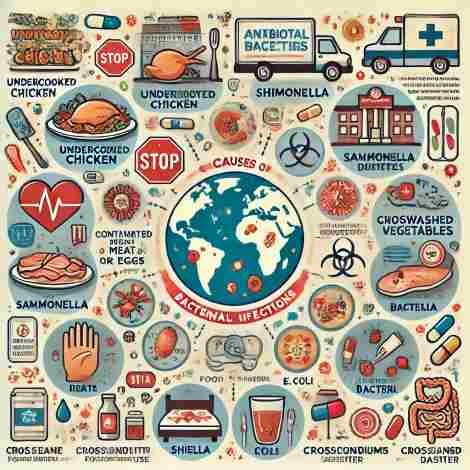
Here are some common causes of intestinal bacterial infections:
- Undercooked Chicken (Campylobacter): Eating chicken that is not fully cooked can lead to a Campylobacter infection.
- Contaminated Meat, Poultry, or Eggs (Salmonella): Salmonella spreads through meat, poultry, or eggs that are not handled or cooked correctly.
- Travel to Developing Countries (Shigella): People traveling to places with poor sanitation can catch Shigella by eating contaminated food or water.
- Hospital Stays or Antibiotic Use (Clostridium difficile): Clostridium difficile is often found in hospitals and can be linked to the overuse of antibiotics.
- Raw Meat and Unwashed Produce (E. coli): E. coli can be found in raw meat, unpasteurized dairy, or unwashed fruits and vegetables.
- Contaminated Water: Water used for washing food or irrigating crops can carry bacteria if it’s polluted with animal or human waste.
- Poor Food Handling: Improper food storage, handling, or cooking at home, in restaurants, or in grocery stores can spread bacteria.
- Improper Cleaning of Utensils: Not cleaning cutting boards, knives, or other kitchen tools after handling raw meat can spread bacteria to other foods.
- Unhygienic Cooking Practices: Touching food with unwashed hands or using dirty surfaces can introduce bacteria.
- Cross-Contamination: Using the same utensils for raw and cooked food without washing them can cause cross-contamination.
- Using Unclean Water: Drinking or using contaminated water for cooking can introduce bacteria into the body.
Recommended Readings: Best Antibiotics For Acne And Pimples
Common Antibiotics for Intestinal Bacterial Infections
Common Antibiotics for Intestinal Bacterial Infections
Common antibiotics for intestinal bacterial infections include ciprofloxacin and metronidazole, which are often prescribed to target harmful bacteria in the digestive system. These antibiotics help alleviate symptoms and treat the infection effectively.
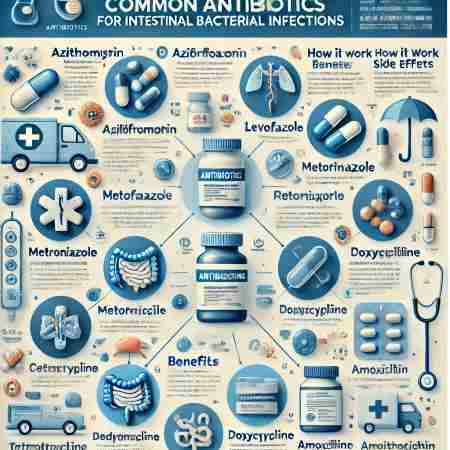
Antibiotics are often prescribed to treat intestinal bacterial infections, especially when symptoms like vomiting, diarrhea, or abdominal pain become severe or last a long time. Here are the common antibiotics used to treat intestinal infections:
Azithromycin (Zithromax)
- Use: Commonly used for treating dysentery, febrile diarrhea, and infections caused by Shigella or Campylobacter bacteria.
- How It Works: Stops the growth of bacteria, helping to clear the infection.
- Benefits: Effective for severe bacterial diarrhea and traveler’s diarrhea.
- Side Effects: This may include nausea, stomach pain, and allergic reactions.
Ciprofloxacin (Cipro)
- Use: Often prescribed for dysentery and febrile diarrhea caused by bacteria like Shigella or Campylobacter.
- How It Works: Prevents bacteria from replicating by blocking their DNA process.
- Benefits: Quickly relieves symptoms of bacterial infections.
- Side Effects: Possible side effects include dizziness, headaches, and increased sensitivity to sunlight.
Levofloxacin
- Use: Another option for treating dysentery and diarrhea caused by bacterial infections.
- How It Works: Blocks bacteria from copying their DNA, which helps stop the infection.
- Benefits: A strong antibiotic for more serious intestinal infections.
- Side Effects: May cause nausea, diarrhea, or insomnia.
Metronidazole
- Use: Often used for treating infections like intestinal amebiasis and SIBO (small intestinal bacterial overgrowth).
- How It Works: Kills bacteria and parasites by targeting their cellular function.
- Benefits: Helps with bacterial overgrowth and some parasitic infections.
- Side Effects: Metallic taste in the mouth, nausea, and dizziness.
Rifaximin
- Use: Commonly given for traveler’s diarrhea caused by non-invasive E. coli bacteria.
- How It Works: Targets bacteria within the intestines without affecting other body areas.
- Benefits: Reduces symptoms of diarrhea and bloating.
- Side Effects: Gas, stomach pain, or nausea.
Ceftriaxone
- Use: Prescribed in more serious cases of salmonellosis or severe intestinal infections.
- How It Works: Destroys bacteria by damaging their cell wall.
- Benefits: Treats severe bacterial infections effectively.
- Side Effects: Pain at the injection site, rash, or fever.
Co-trimoxazole
- Use: Used to treat prolonged diarrhea, particularly when caused by certain bacterial strains.
- How It Works: Combines two antibiotics to prevent bacteria from multiplying.
- Benefits: Effective for stubborn cases of bacterial infections.
- Side Effects: Allergic reactions, low blood count, or rash.
Tetracycline
- Use: Works for a variety of bacterial infections, including those affecting the intestines.
- How It Works: Blocks bacteria from making essential proteins, stopping their growth.
- Benefits: Treats infections like cholera and traveler’s diarrhea.
- Side Effects: This can cause tooth discoloration, nausea, and sun sensitivity.
Doxycycline
- Use: Often used for traveler’s diarrhea and other intestinal bacterial infections.
- How It Works: Prevents bacteria from making proteins, halting their growth.
- Benefits: Effective for both intestinal and other bacterial infections.
- Side Effects: Stomach upset, diarrhea, and increased sun sensitivity.
Amoxicillin
- Use: Sometimes combined with other medications to treat H. pylori infections that cause ulcers and digestive problems.
- How It Works: Breaks down the bacterial cell wall, killing the bacteria.
- Benefits: Treats stomach infections and ulcers.
- Side Effects: Diarrhea, rashes, or allergic reactions.
Clarithromycin
- Use: Similar to azithromycin, used for severe bacterial infections in the intestines.
- How It Works: Prevents bacteria from growing by stopping them from making proteins.
- Benefits: Helps with severe infections and respiratory conditions.
- Side Effects: May cause nausea, altered taste, and stomach upset.
When Should Antibiotics Be Used?
They are typically given when symptoms are severe, or persistent, or if there is a risk of complications. Using antibiotics unnecessarily or not completing the full course can lead to antibiotic resistance, making it harder to treat future infections.
Recommended Readings: The Counter Antibiotics For Tooth Infection
Complementary Treatments to Antibiotics for Bacterial Infections
Other Treatments Options
Complementary treatments to antibiotics for bacterial infections include probiotics and adequate hydration, which support gut health and aid recovery. Additionally, a balanced diet can help strengthen the immune system during treatment.
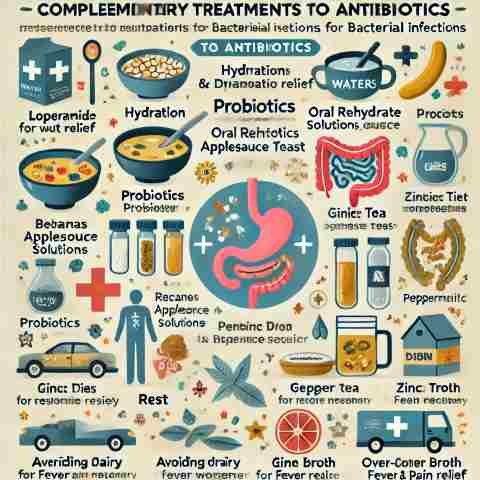
Loperamide
- Use: Helps to control diarrhea.
- How It Works: Slows down bowel movements, reducing urgency and frequency.
- Benefit: Provides quick relief from severe diarrhea, helping you manage symptoms better.
Hydration
- Use: Prevents dehydration caused by vomiting and diarrhea.
- How It Works: Drinking water and fluids, especially Oral Rehydration Solutions (ORS), replace lost fluids.
- Benefit: Keeps you hydrated and balances essential body fluids.
Probiotics
- Use: Restores gut bacteria balance.
- How It Works: Introduces good bacteria to support digestive health and reduce diarrhea.
- Benefit: Helps the gut recover from antibiotic use by promoting a healthy digestive system.
Electrolyte Solutions
- Use: Replaces salts and minerals lost due to dehydration.
- How It Works: Provides essential electrolytes like sodium and potassium.
- Benefit: Helps maintain body function and prevents weakness caused by dehydration.
BRAT Diet (Bananas, Rice, Applesauce, Toast)
- Use: Eases digestive issues.
- How It Works: Consists of bland, easy-to-digest foods that help reduce nausea and diarrhea.
- Benefit: Provides a simple way to maintain nutrition without straining the digestive system.
Zinc Supplements
- Use: Supports recovery from diarrhea, especially in children.
- How It Works: Strengthens the immune system and promotes healing.
- Benefit: Shortens the duration of diarrhea and supports quicker recovery.
Ginger Tea
- Use: Relieves nausea and vomiting.
- How It Works: Contains natural anti-nausea properties that calm the stomach.
- Benefit: Provides natural relief from nausea and helps settle an upset stomach.
Peppermint
- Use: Soothes digestive issues like cramps and gas.
- How It Works: Peppermint’s calming effects help relax digestive muscles.
- Benefit: Reduces discomfort from gas and bloating, easing digestion.
Rest
- Use: Allows your body to recover.
- How It Works: Rest helps your body focus its energy on fighting off the infection.
- Benefit: Speeds up recovery by allowing your immune system to work efficiently.
Avoid Dairy
- Use: Prevents worsening of symptoms.
- How It Works: Some dairy products can make diarrhea worse during infection.
- Benefit: Reduces the risk of irritation or worsening of symptoms.
Clear Broth
- Use: Provides light nourishment and hydration.
- How It Works: Easy-to-digest clear broth offers fluids and electrolytes without overwhelming the digestive system.
- Benefit: Keeps you hydrated and provides some nutrition without adding stress to your stomach.
Over-the-Counter Pain Relievers
- Use: Alleviates fever and abdominal pain.
- How It Works: Medications like acetaminophen reduce pain and fever.
- Benefit: Provides relief from discomfort, allowing you to feel better during recovery. Always consult a doctor before use.
Recommended Readings: Best Antibiotic For Breast Infection | Breast Infection Treatment
Symptoms of Intestinal Bacterial Infection
Symptoms of Intestinal Bacterial Infection
Symptoms of intestinal bacterial infections include abdominal pain, diarrhea, nausea, and vomiting. In severe cases, fever and blood in the stool may also occur.
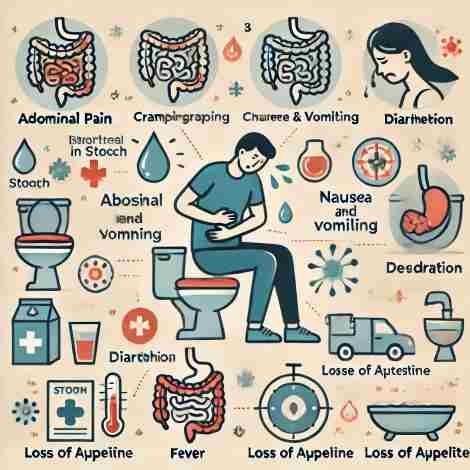
Intestinal bacterial infections often cause problems in the digestive system. Here are some common symptoms of an intestinal bacterial infection:
- Abdominal Pain and Cramping:
- Pain in the stomach area and cramping are early signs of an infection in the intestines.
- Diarrhea:
- Frequent loose stools are a common symptom of an intestinal bacterial infection.
- Nausea and Vomiting:
- Feeling sick and vomiting can occur as the body tries to get rid of the bacteria.
- Dehydration:
- Loss of fluids from diarrhea or vomiting can cause extreme thirst, dry mouth, and dark-colored urine.
- Fever:
- A fever often happens when the body is trying to fight off the bacterial infection.
- Fatigue:
- Feeling tired or weak is common as the body fights the infection and deals with dehydration.
- Loss of Appetite:
- Many people with intestinal infections lose interest in eating due to nausea and stomach discomfort.
- Blood in Stool:
- Seeing blood in your stool can be a sign of a more serious infection like dysentery.
- Mucus in Stool:
- In some cases, mucus may be present in the stool, indicating infection in the intestines.
- Bloating and Gas:
- An infection can cause bloating and excessive gas, making the stomach feel full and uncomfortable.
- Urgent Need to Use the Bathroom:
- There may be a sudden, strong need to pass stool, often with diarrhea.
Recommended Readings: Antibiotics For Stomach Infection | Antibiotics For Gastroenteritis
Side Effects of Intestinal Bacterial Infection
Here are some common side effects of an intestinal bacterial infection:
- Nausea and Vomiting: Feeling sick to the stomach and vomiting are early reactions to the infection.
- Abdominal Pain: Pain or discomfort in the stomach area is a frequent symptom.
- Diarrhea: Many people experience frequent, watery stools, and in some cases, the diarrhea may be bloody.
- Bloating: The infection can cause gas and bloating, making your stomach feel tight and swollen.
- Loss of Appetite: You may not feel like eating, which can lead to temporary loss of appetite.
- Fever: A fever is the body’s way of trying to fight off the infection.
- Headache: Headaches are common due to the body being under stress from the infection.
- Unintentional Weight Loss: Weight loss can happen because of diarrhea, vomiting, and a lack of appetite.
- Fatigue: You may feel weak and tired due to the infection draining your energy.
- Dehydration: Losing fluids from diarrhea and vomiting can lead to dehydration, causing extreme thirst, dry mouth, and dizziness.
- Electrolyte Imbalance: Severe cases can lead to imbalances in essential minerals like sodium and potassium, affecting body function.
When to Seek Medical Help
When to Seek Medical Help
You should seek medical help if you experience high fever, severe dehydration, blood in your stool, or if symptoms persist despite taking antibiotics. These could indicate a serious infection requiring urgent care.
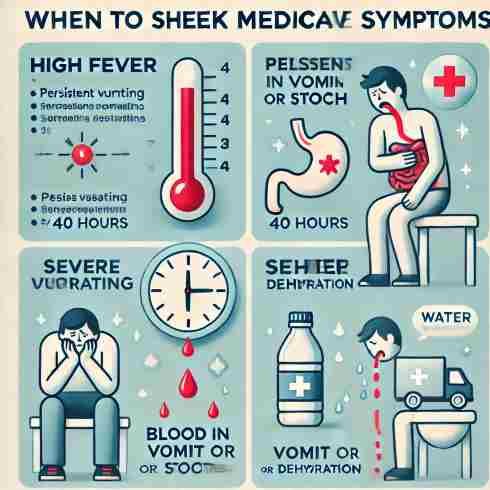
- High Fever: If your fever goes above 104°F (40°C), it could indicate a severe infection.
- Persistent Vomiting: Vomiting that lasts for more than 48 hours can lead to dehydration and requires immediate care.
- Blood in Vomit or Stool: If you notice blood when you vomit or pass stool, it’s important to see a doctor as this can signal a more serious issue.
- Severe Diarrhea or Dehydration: If diarrhea persists for over four days or if you show signs of dehydration, such as dizziness, dry mouth, or little to no urination, seek medical help immediately.
Recommended Readings: Best Antibiotics For Vaginal Infection | Vaginal Itching
Benefits of Antibiotics
- Reduces Symptoms:
- Antibiotics help to reduce the severity of symptoms like diarrhea, vomiting, and abdominal pain, making the infection more manageable.
- Faster Recovery:
- They can shorten the duration of the illness, allowing patients to recover more quickly from the infection.
- Prevents Spread of Infection:
- By targeting the bacteria, antibiotics can help reduce the spread of infection to others, especially in close-contact settings.
- Stops Bacterial Growth:
- Antibiotics work by either killing bacteria or preventing them from multiplying, which helps stop the infection from worsening.
- Reduces Risk of Complications:
- In severe cases, antibiotics can help prevent serious complications, such as dehydration, kidney failure, or blood infections.
- Clears Bacterial Shedding:
- Antibiotic treatment can decrease bacterial shedding, meaning that the patient is less likely to spread the bacteria through fecal matter.
- Improves Overall Well-being:
- By tackling the root cause of the infection, antibiotics improve overall health and energy levels, allowing the patient to feel better.
- Helps with Specific Bacterial Strains:
- Antibiotics are effective against specific bacterial infections like Salmonella, Shigella, Campylobacter, and E. coli, which are common causes of intestinal infections.
- Useful for Severe Cases:
- Antibiotics are often the first line of defense in severe cases, where symptoms are persistent or life-threatening.
- Reduces Hospital Stay:
- In hospitalized patients, the use of antibiotics can help reduce the length of hospital stays by speeding up recovery.
- Helps with Recurrent Infections:
- For those who suffer from recurrent bacterial infections, antibiotics can help reduce the frequency and severity of future infections.
Risks of Antibiotic Resistance
While antibiotics are effective, it’s important to use them properly. Overuse or misuse of antibiotics can lead to antibiotic resistance, where bacteria evolve and become harder to treat. It’s essential to follow the prescribed dosage and complete the full course of treatment to avoid resistance.
Recommended Readings: The Counter Antibiotics For Tooth Infection
Best Ways to Prevent Intestinal Bacterial Infections
Best Ways to Prevent Intestinal Bacterial Infections
The best ways to prevent intestinal bacterial infections include practicing good hygiene, such as washing hands regularly, and ensuring that food is cooked and stored properly to avoid contamination.
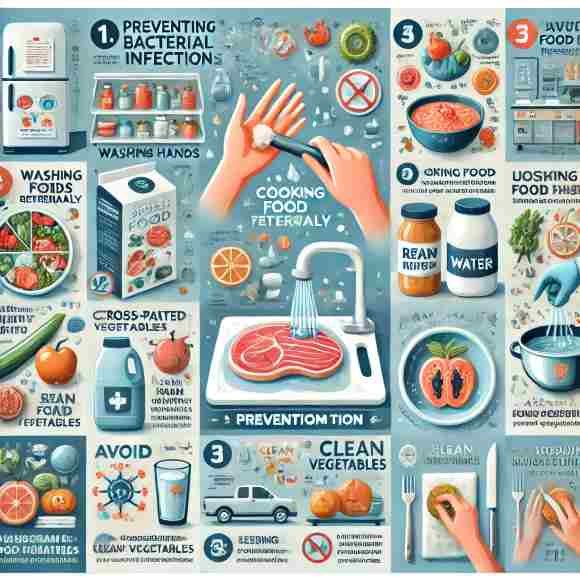
- Wash Hands Regularly:
- Proper hand hygiene is essential. Wash your hands with soap and water, especially after using the restroom and before eating or preparing food.
- Cook Food Thoroughly:
- Ensure that meats, especially poultry and seafood, are cooked to the right internal temperature to kill harmful bacteria.
- Store Food Safely:
- Refrigerate leftovers promptly to prevent bacterial growth, and avoid eating food past its expiration date.
- Use Clean Water:
- Drink clean, filtered water, and avoid consuming untreated water, especially when traveling to areas with questionable water quality.
- Wash Fruits and Vegetables:
- Rinse fresh produce thoroughly to remove dirt and bacteria that may be present on the surface.
- Avoid Cross-Contamination:
- Keep raw meat separate from other foods while cooking to avoid the spread of bacteria onto other items.
- Practice Safe Food Handling:
- Use separate cutting boards and utensils for raw meat, and ensure all kitchen tools are cleaned properly after use.
- Peel or Cook Vegetables in High-Risk Areas:
- When traveling in areas with lower food safety standards, it’s safer to peel fruits and cook vegetables to reduce the risk of contamination.
- Avoid Unpasteurized Products:
- Stay away from unpasteurized milk, cheese, and juices, as they may contain harmful bacteria.
- Maintain Personal Hygiene:
- Ensure personal hygiene practices, like keeping nails clean and avoiding touching your face while preparing food, are maintained to prevent the transfer of bacteria.
- Disinfect Surfaces:
- Regularly clean and disinfect kitchen surfaces, especially after preparing raw food, to eliminate any potential bacteria.
FAQs
What Are Antibiotics?
Antibiotics are medications designed to treat bacterial infections by killing bacteria or stopping their growth. They are not effective against viruses such as the common cold or flu.
When Should I Use Antibiotics for an Intestinal Infection?
Antibiotics should be used if your symptoms are severe, last longer than usual, or pose a risk of complications. Never self-prescribe antibiotics, and always follow a doctor’s advice to prevent antibiotic resistance.
What Are Common Antibiotics for Intestinal Infections?
Common antibiotics for intestinal infections include Azithromycin, Ciprofloxacin, Levofloxacin, Metronidazole, Rifaximin, Ceftriaxone, Co-trimoxazole, Tetracycline, Doxycycline, Amoxicillin, and Clarithromycin.
Can I Take Over-the-Counter Medications Along with Antibiotics?
Yes, over-the-counter pain relievers like acetaminophen can be used to reduce fever and discomfort.
What Can I Do to Complement Antibiotic Treatment?
Complementary treatments to antibiotics include:
Probiotics: To restore healthy gut bacteria.
Hydration: Drink plenty of fluids, especially Oral Rehydration Solutions (ORS).
BRAT Diet: Eat simple foods like bananas, rice, applesauce, and toast.
Electrolyte solutions: To maintain mineral balance.
What Should I Avoid While Taking Antibiotics?
It’s important to avoid dairy products as they can worsen symptoms and affect the absorption of the medication. Alcohol should be avoided because it can interfere with how antibiotics work. Consuming unwashed produce is also discouraged, as it may introduce new bacteria and worsen the infection.
When Should I Seek Medical Help?
You should seek medical help immediately if you experience a high fever, blood in your stool, severe dehydration, or if there is no improvement in symptoms after starting antibiotics. These could be signs of complications that require urgent medical attention.
Recommended Readings: Antibiotics For UTI | Antibiotics For UTI In Men+Women
Conclusion
Antibiotics play an important role in treating intestinal bacterial infections, particularly those that cause vomiting and diarrhea. However, it’s vital to use them carefully and only under a doctor’s advice to avoid problems like antibiotic resistance.
Along with medication, following proper hygiene, safe food handling, and getting medical help when needed are key to preventing and managing these infections effectively.
Disclaimer
Commissions we earn from partner links on this page do not influence our content. Our editorial content is based on thorough research and insights from qualified medical professionals to ensure the highest standards of accuracy and reliability.
Information provided on Doseway is for educational purposes only. Your health and wellness are unique to you, and the products and services we review may not be suitable for your circumstances. We do not offer personal medical advice, diagnosis, or treatment plans. For specific advice, please consult with a healthcare professional. Doseway adheres to strict editorial integrity standards. To the best of our knowledge, all content is accurate as of the date posted, though offers and information may change. The opinions expressed are the author’s own and have not been influenced, approved, or endorsed by our partners.

 Cart is empty
Cart is empty
Add a Comment